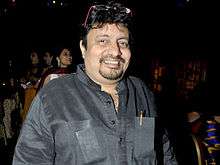Neeraj Vora
| Neeraj Vora | |
|---|---|
 | |
| Born |
22 January 1963 Bhuj, India |
| Occupation | Writer, Director, Producer, Actor |
| Parent(s) |
Pandit Vinayak Rai Vora Premila Vora |
Neeraj Vora (born 22 January 1963) is an Indian film director, writer, actor and composer from Gujarat[1] who works in Bollywood.. His made a mark in Bollywood with his work as a writer for Aamir Khan's film Rangeela. His directorial debut was Khiladi 420 in 2000. Later in 2006, he wrote and directed Phir Hera Pheri and directed many other films after that. He suffered a brain stroke on 20 Oct. 2016 putting him into coma. He is working on Hera Pheri 3 as a writer and director. His work, true to his beliefs, has always been about "complete family entertainment." The stories and characters created by him touch the hearts of people from all age groups. He is a serious comic writer and director.
Early life & career
He was born in Bhuj in a simple Gujarati family in 1963. His father, Pandit Vinayak Rai Nanalal Vora was a classical musician and a proponent of Tar- Shehnai. He popularised Tar- Shehnai as the solo instrument for classical music. As a child Neeraj Vora had no access to Bollywood movies. As he hailed from a classical musicians' family, listening to film music and watching films was not allowed. His mother Premila Ben had a tremendous fascination for films, and she used to secretly take her son Neeraj to watch movies. That's how he was introduced to the world of cinema.
Luckily, a lot of Gujarati drama stalwarts followed his father’s work and knew him personally following which he got inclined towards Gujarati theatre. His love for theatre began at the age of 6, and when his father discovered this at the age of 13 he supported Vora and asked him to follow his passion.
Acting
During his college days, he started working professionally as an actor and he received intercollegiate awards for drama. In 1984 he worked for a film Holi by Ketan Mehta and later did a television show Choti Badi Baatien, Circus. He later worked as an actor in Rangeela too, as the film director wanted to bring down the sets and the actor was absent. Neeraj Vora, who had written the script, played the role to finish shooting. After seeing that scene, Anil Kapoor and Priyadarshan called him for Virasat followed by Aamir for Mann and several other projects.
Drama
His Gujarati play Aflatoon which was a superhit in 1992 was adopted by Rohit Shetty for Golmaal. The play was written and directed by Neeraj Vora.
Writing
After circus in 1993, Neeraj Vora, Ashutosh Gowarikar and Deepak Tijori got together and made Pehla Nasha with Deepak Tijori as lead actor. Neeraj Vora was the writer and his he along with his brother directed music as Neeraj-Uttank. Later his career in writing took off after he wrote for Rangeela and then Akele Hum Akele Tum, Josh, Badshah, Chori Chori Chupke Chupke, Awara Paagal Deewana, Deewane Huye Paagal, Ajnabee and Hera Pheri, Phir Hera Pheri among many others. Vora’s work has always been appreciated by the critics. For Phir Hera Pheri, film critic Taran Adarsh said, "Vora's dialogues, as always, are outstanding!"
Direction
He first directed Khiladi 420 which didn’t do well. After that he decided to produce movies and took up Familywala and Garam Masala. After writing Awara Paagal Deewana and Deewane Huye Paagal for Firoz Nadiadwala they then collaborated for Phir Hera Pheri. Phir Hera Pheri was to be directed by Satish Kaushik, but following the problems with dates, Neeraj Vora got the chance to direct it. Vora was slated to direct Hera Pheri III, but ultimately was replaced by Ahmed Khan following the departure of actors John Abraham, Abhishek Bachchan and Sunil Shetty due to conflicts with Vora.
Awards
Nominated
2000: Screen Award for Best Screenplay - Khiladi 420
2000: Screen Award for Best Dialogs - Khiladi 420
Won
2000: Screen Award for Best Screenplay - Hera Pheri
2000: Screen Award for Best Dialogs - Hera Pheri
Lions Gold award
Pearls Ratna Awards
Filmography
Director
- Run Bhola Run (2016)
- Hera Pheri 3[2]
- Shortkut: The Con Is On (2009)
- Familywala (2009)
- Phir Hera Pheri (2006)
- Khiladi 420 (2000)
Actor
- Welcome Back (film) (2015)
- Bol Bachchan (2012)
- Kamaal Dhamaal Malamaal (2012)
- Department (2012)
- Tezz (2012)
- Khatta Meetha (2010)
- Na Ghar Ke Na Ghaat Ke (2010)
- Familywala (2009)
- Maine Dil Tujhko Diya (2002)
- Tum Se Achcha Kaun Hai (2002)
- Company (film) (2002)
- Yeh Teraa Ghar Yeh Meraa Ghar (2001)
- Dhadkan (2000)
- Har Dil Jo Pyar Karega (2000)
- Jung (2000)
- Pukar (2000)
- Mast (1999)
- Hello Brother (1999)
- Baadshah (1999)
- Mann (film) (1999)
- Satya (film) (1998)
- Daud: Fun on the Run (1997)
- Virasat (1997)
- Akele Hum Akele Tum (1995)
- Rangeela (1995)
- Raju Ban Gaya Gentleman (1992)
- Holi (1984)
References
- ↑ "'Short Kut' a fun hare and tortoise story: Neeraj Vora". Deccan Herald. Retrieved 10 September 2010.
- ↑ "Abhishek Bachchan and John Abraham team up for Hera Pheri 3". Bollywood Hungama.